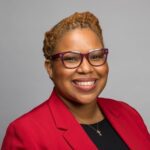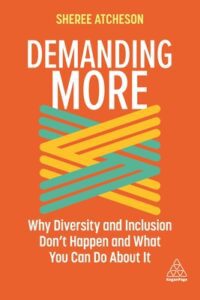Volume 36 Number 1 | February 2022
Dana Powell Baker, MBA, MS, MLS(ASCP)CM, ASCLS Diversity Advocacy Council Contributor, ASCLS Emerging Laboratory Managers Collaborative Conference Steering Committee Vice Chair
Kyle Riding, PhD, MLS(ASCP)CM, ASCLS Diversity Advocacy Council Contributor, ASCLS Secretary/Treasurer

In a 2018 article, Forbes magazine contributor Sheree Atcheson defined an ally as “any person that actively promotes and aspires to advance the culture of inclusion through intentional, positive and conscious efforts that benefit people as a whole.” As an award-winning global diversity, equity, and inclusion leader and author of Demanding More: Why Diversity and Inclusion Aren’t Happening and What You Can Do About It, Atcheson asserted that “everyone has the ability to be an ally.”
While this concept of being an ally is not a novel one, critical conversations throughout our society over the last two years have called on each of us to reflect on how we can (i) be an ally and (ii) become better allies. In Spring 2021, the ASCLS Diversity Advocacy Council (DAC) hosted a meeting that aimed to catalyze a conversation about the important role of allyship within our profession. Some very important concepts came out of this discussion and are shared here to help us all reflect on how we can continue working towards being awesome allies.
Tip 1: Speak Alongside Those You Ally With
One of the most important and central concepts to keep in mind when being an ally is that you may not be facing the systemic/historic underrepresentation your colleagues may experience. For this reason, do not try to step out in front and lead the dialogue or act as an expert to a perspective for which you have no lived experience. No underrepresented group is a monolithic entity. For this reason, there are varying feelings and experiences they have lived through, and the ally should not try to step out in front and act as the spokesperson for all these perspectives. Although the intention is to help your colleague, the gesture may come across as inauthentic and can further marginalize your colleagues.
Instead, be a force of positive change through the simple act of listening. When a colleague is describing a situation where there is a lack of inclusion or bias, actively listen and try not to respond with your opinion on the matter. Do not assume they demand action from you because in some cases they may not need a “savior” to step in and protect them from the microaggressions or bias they are encountering in the workplace or in another setting.
The simple act of actively listening and acknowledging your colleagues’ perspective as valued will let them know that you are there to serve as an ally or agent of change alongside them. This is how trust is built and furthermore promotes a culture of inclusion by assuring all voices are heard.
Tip 2: A Person is Many Things
Throughout the day, our brains process countless tasks and external stimuli. To help process some of this mental data, we have developed an ability to lump things into easily identifiable buckets. Each of these buckets is then more readily processed by our brain as a list of traits we can rapidly assess in any given moment.
While this ability to breakdown things into simple concepts is ideal for items like food (e.g., oh jalapeño peppers are spicy and I don’t like the way spicy makes me feel so I won’t eat it) or things we encounter in the environment (e.g., oh that pond has alligators in it and alligators bite people so I won’t swim there), it is often misused when we apply it to people.
One of the biggest missteps we can make as an ally is treating a colleague as unidimensional. For example, one of the authors of this article self identifies as a gay man. It would be easy to ask him about his experience as a gay man. Granted, he would be able to share his own unique perspective and experiences. However, this does not mean that he can be the representative or speak for the entire LGBTQ+ community. He can only speak to his own worldview and lived experience. While his sexual orientation may be an important part of how he views himself, it is not the only perspective he may represent.
A person is an amalgamation of a variety of worldviews and should not be placed into one bucket nor looked at as the sole, authoritative voice on an issue related to a community to which they may intersect. As defined by the Merriam-Webster Dictionary, intersectionality is “the complex, cumulative way in which the effects of multiple forms of discrimination (such as racism, sexism, and classism) combine, overlap, or intersect especially in the experiences of marginalized individuals or groups.”
Professor Kimberlé Crenshaw first introduced the theory of intersectionality over 30 years ago and described this as an overlapping of inequalities rather than distinct or isolated categories (e.g., race, gender, class). This idea of “intersecting identities” demonstrates that the experiences of people are unique and should be treated as such in this prism of intersectionality.
To that end, engaging in the act of tokenism—defined by Merriam-Webster as “the practice of doing something (such as hiring a person who belongs to a marginalized population) only to prevent criticism and give the appearance that people are being treated fairly”—is not ideal for an ally. Assuming that it is enough to speak to only one or two individuals about an issue facing the underrepresented or marginalized group to which they identify is a potential misstep because no one person can fully encapsulate the views of all individuals that comprise a group of people.
To clarify, this is not to say that their voice is not valid or that you should not fully listen. You should listen to them, you should hear what they are saying, and you should continue to affirm that you are willing to stand alongside them to make conscious efforts to create an inclusive environment. However, it is important to not suggest you now fully understand the concerns and perspectives of that entire community.
Tip 3: Education is Your Job
Curiosity is part of human nature. When we know there is an issue and we wish to address it, one of our first reactions—besides trying to immediately fix it—is to learn more about it. Our experiences with education often involve seeking out an expert or scholar in the field of inquiry and sitting under their learning tree. However, it is not appropriate to expect those who are underrepresented in our profession to educate you on the history and issues pertaining to diversity and discrimination. For some, having to explain or educate others about their community’s marginalization may be traumatizing. For others, it may be exhausting to continually explain why and feel like nothing is changing. Through all this, the person that you are expecting to educate you about these matters may not disclose that having to educate you is not ideal for their own personal wellness.
Preferably, the ideal scenario is taking time to educate yourself as much as you can. Search for credible resources that can provide you information about underrepresentation or marginalization, research the greater societal concerns these communities face, and build a database of knowledge that empowers you to appreciate the issue more appropriately. Again, this does not make you an expert who has lived any particular community’s experience; however, it does mean that you are truly making strides to achieve Sheree Atcheson’s definition of an ally through “intentional, positive and conscious efforts that benefit people as a whole.”
Next Steps towards Being an Awesome Ally
Any initiative towards lasting change begins with taking the first step. In alignment with the mission and vision of ASCLS, including the goals of the ASCLS DAC, we are putting our actions in sync with our words. As a duty to our patients, colleagues, and society, we need to #Labvocate for diversity in our profession and the diverse patient populations we care for as laboratory professionals. To be an awesome ally, Atcheson (2018) shared the following steps towards true allyship as published in her Forbes article, “Allyship—the key to unlocking the power of diversity.”
- Lift others up by advocating. That’s right … #Labvocate!
- Share growth opportunities with others. This includes sharing leadership opportunities and engaging our diverse membership in volunteer activities.
- Do not view venting as a personal attack. Remember active listening and acknowledgement of one’s experience.
- As colleagues and healthcare professionals, recognize systematic inequalities (e.g., lack of health equity, healthcare disparities, discrimination) and realize the impact of microaggressions on others.
- Believe the experiences of underrepresented people.
- Most importantly listen, provide support, self-reflect, and change. Be intentional.
As long we maintain the shared perspective that diversity is our strength as a profession, then we are on our way to valuing the power of allyship. It starts with taking the first step and continuing to make progressive strides forward towards inclusivity.
References
- Atcheson, S. (2018, December 14). “Allyship—the key to unlocking the power of diversity.” Forbes. https://www.forbes.com/sites/shereeatcheson/2018/11/30/allyship-the-key-to-unlocking-the-power-of-diversity/?sh=583826b249c6
- Coaston, J. (2019, May 28). “The intersectionality wars.” Vox. https://www.vox.com/the-highlight/2019/5/20/18542843/intersectionality-conservatism-law-race-gender-discrimination
- Merriam-Webster. (n.d.). Intersectionality. In Merriam-Webster.com dictionary. Retrieved from https://www.merriam-webster.com/dictionary/intersectionality
Dana Powell Baker is Assistant Professor at the University of Kansas Medical Center in Kansas City, Kansas.
Kyle Riding is Assistant Professor of Medicine at the University of Central Florida, in Orlando, Florida.
The ASCLS Diversity Advocacy Council held book club discussions on Demanding More throughout 2021 and January 2022.
“The simple act of actively listening and acknowledging your colleagues’ perspective as valued will let them know that you are there to serve as an ally or agent of change alongside them.”

